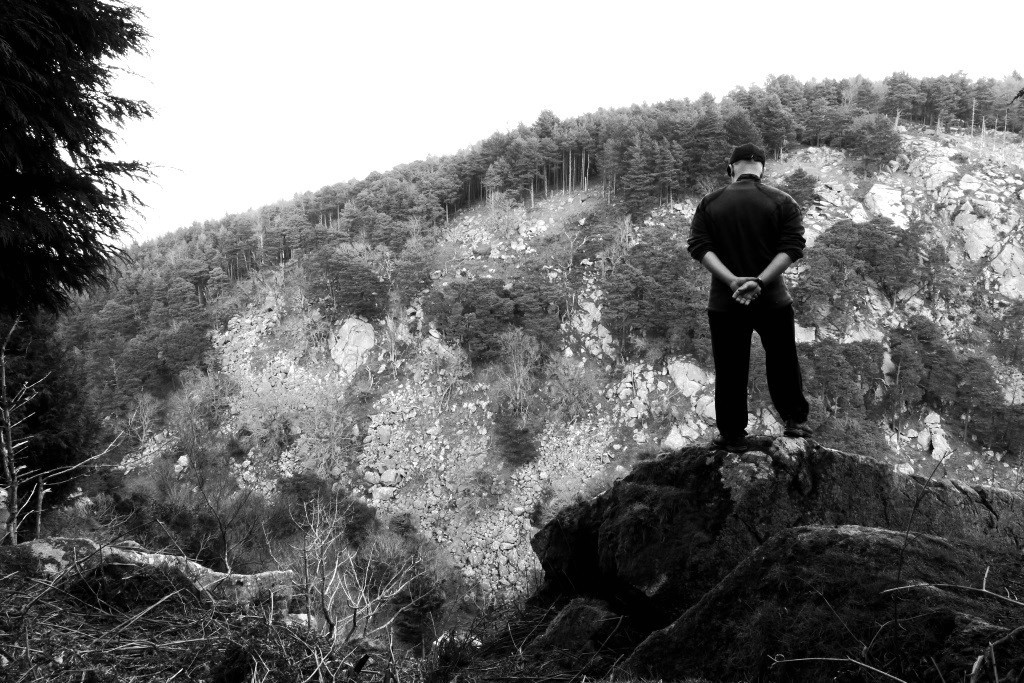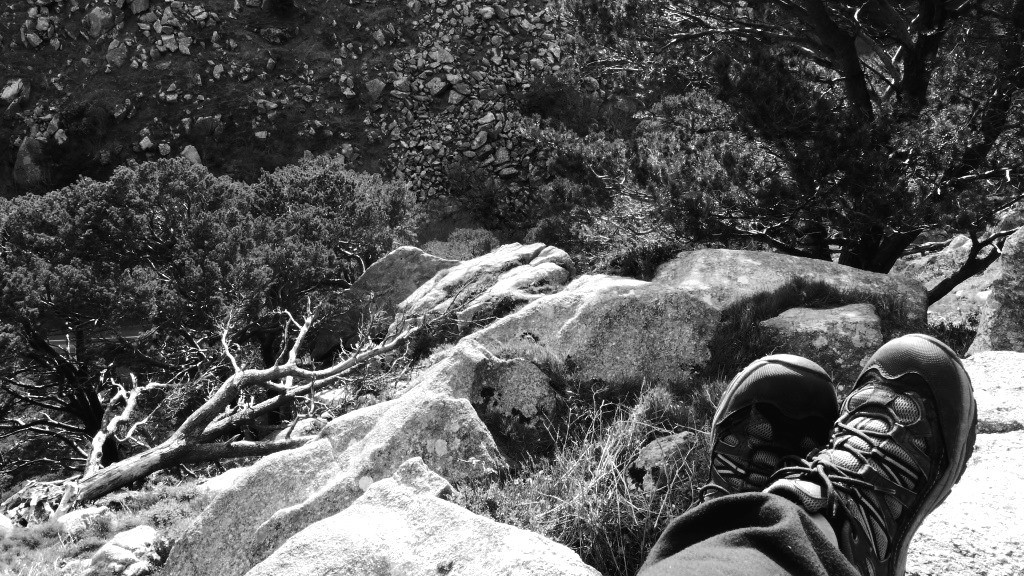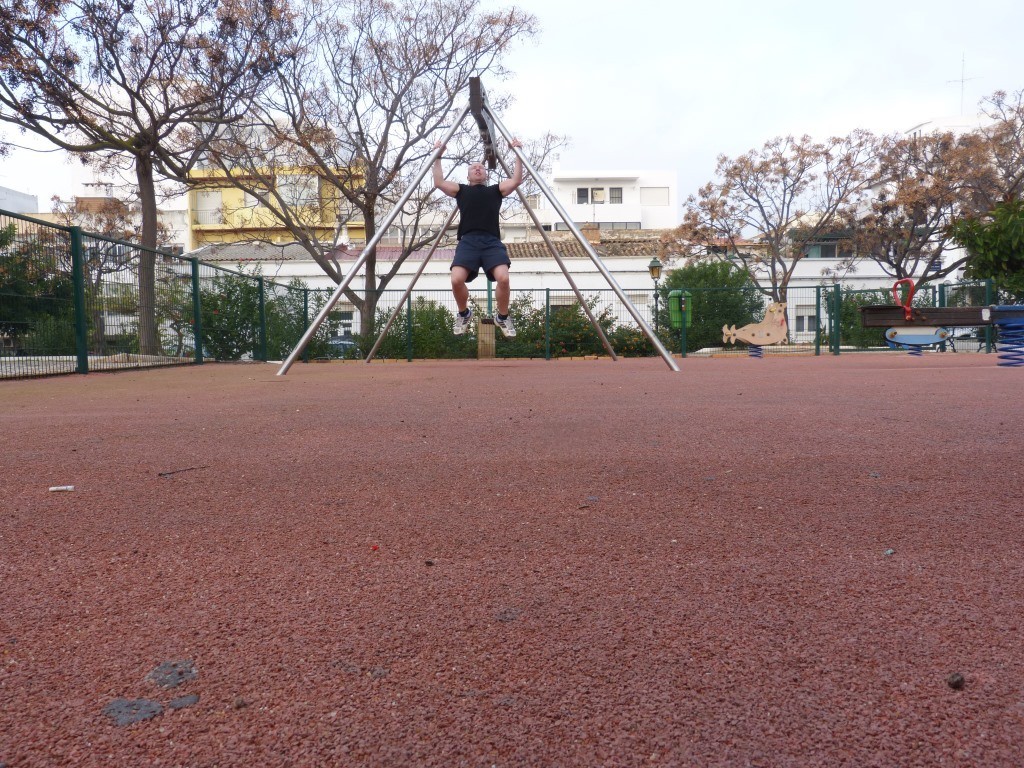By Sean Fagan

When venturing into wild places - it's always good practise to be vigilant (Photo: Sean Fagan).
.
.
Avoiding Violent Encounters...
6 tips on how to avoid encounters of the bad kind
.
Self-defence is a contentious issue to bring up in conjunction with the mostly recreational activity of bushcraft.
But it’s something I feel compelled to do as I strongly believe it’s an important but generally overlooked aspect of bushcaft.
The reality is, when we go bushcrafting in wild, remote places we are physically isolated.
And with the ever increasing popularity of bushcrafting/adventuring occurring across the globe it’s important to address this thorny issue of protecting ourselves from potentially dangerous people.
First off, I’m not a self-defence expert.
When younger I had a strong interest in boxing, self-defence and martial arts so I’m not exactly a novice in this area.
Also, I’ve travelled to remote wild and urban places across the world so I know from experience on how to avoid potentially unsavoury situations from escalating or even starting off.
.

The outdoors has some obvious physical risks such as falling from a height - but depending on where you venture there can be risks from other humans. It's always a good idea to research about such possible risks beforehand - and to avoid them as best you can (Photo: Sean Fagan).
.
.
The World is a Safe and Unsafe Place
.
Let’s be real. There are some parts of the world where the law of the land is a little (or a lot) on the loose side.
When you add into the equation that bushcrafters are often ambling around alone or in small groups - there is an air of potential vulnerability.
I want to stress that I’ve found the vast majority of my travels aboard and at home – safe!
I don’t want to remotely put off people from visiting wild places with minimal gear.
What I want to do is encourage an awareness of this small but significant risk.
I can’t, for mostly legal reasons, offer actual advice on how to deter and quell a violent attack.
But what I can do is offer practical tips on how to avoid such encounters.
.
A Little Common Sense goes a Long Way
.
I cannot stress enough that a little common sense (along with good situational awareness and prior research) is, what I believe, the most important factor in remaining safe and secure when bushcrafting aboard or near to home.
What I’m mostly offering here is nothing more than basic common sense (based mostly on my own experiences). Nothing fancy.
.
6 Tips on how to Avoid Violent Encounters
.
.
- Improve your Situational Awareness
.
I put this first as I think it’s the most important factor in avoiding dangerous situations. How does one improve situational awareness? By becoming more habitually aware of your surroundings.
I strongly believe awareness-based bushcraft activities, when practised regularly, will massively improve your ‘sixth’ sense as regards detecting potential trouble. Activities such as tracking, outdoor awareness skills and stalking wild animals are brilliant for sharpening our senses when outdoors.
.
2. Get Fit and Strong
.

Keeping up the good fight. Doing a few chin-ups in Portugal. Simple body-weight exercises like chin-ups are great for improving functional strength (Photo: Sean Fagan).
.
Being fit and strong is often an inevitable by-product of regularly practising bushcraft but there is always room for improvement.
The fact is many people practise bushcraft occasionally (certainly not on a daily basis). So a basic strength and conditioning routine will greatly compliment our ability to handle the very physical pastime of bushcraft - and when you're strong and fit, it’s a natural deterrent to would-be predatory individuals.
I don't believe in doing excessive or complicated exercise routines. Just something that will keep us in reasonably good shape.
Body-weight exercises are great as you don't need a gym - just a little willpower and discipline. They can be done pretty much anywhere and their health benefits extend way beyond improving functional strength.
A very basic, body-weight exercise routine I recommend is:
- Press-ups
- Squats
- Close-Grip Chin ups
- Medium Grip Chin-ups
- Calf Raise
- Lunges
- Hanging Leg Raises
(*All the above exercises (except number 7) can be made more strenuous by wearing a weighted backpack).
.
That's it, nothing fancy. 3-4 sets of each exercise done 2-3 times per week is all you need to become significantly stronger (takes about 15-20 minutes to complete each session, excluding warm-up).
As regards improving cardiovascular fitness - I recommend the following: hill-walking, running, hill-sprints, and cycling or a combination thereof (or any other cardiovascular exercise that takes your fancy).
The fact is, violent people are often instinctively deterred from attacking individuals that look strong and capable of aggressively repelling an attack.
.
3. Do a Good Self-Defence Course
.
I generally don’t recommend participating in a martial arts clubs to bolster up your self-defence skills (although in all probability it will).
What I recommend is attending a good self-defence course or club. Why? Because good self-defence instructors will teach you a range of essential self-defence skills such as situational awareness, assertiveness and posture as well as key, easy-to-learn physical skills that are specific to quickly and effectively deterring an attack.
Many martial arts styles are based on a broad, often complex range of skills that usually takes a lot of time to master - whereas good self-defence is a distillation of what quickly works in potentially violent scenarios – and it's mostly simple (it has to be in highly-charged, aggressive encounters).
Regardless of how simple self-defence is - I also recommend keeping those skills sharp with occasional practice.
Violent encounters can be quick, brutal, unexpected and unconventional. It's best to have your self-defence skills sharp - just in case.
4. Develop your Social skills and Learn to Speak essential Local Language when Aboard
When aboard, being friendly and knowing simple phrases such as hello, excuse me and how are you? can be surprisingly effective ways of taking the venom out of potential confrontations.
What universally helps though - is knowing what social mishaps to avoid.
Years ago, when visiting my brother in Canada, he informed myself of a certain social taboo that was best avoided when talking to some of the first nation people that occupied that part of Canada...eye contact.
Many of the indigenous people believe it to be offensive to look directly into the eyes of someone when talking to them. Some eye contact is welcomed at the start of a conversation but listening while looking to the side is often the norm during the bulk of the conversation.
I remember the first time I saw my brother conversing with an indigenous man in Canada. Both of them looked away to the side while talking.
It really worked when I made an effort to respect this simple, social norm when conversing with first nation people from that area.
Specific cultural norms like this can make a massive difference in how smoothly or difficult social encounters can be.
When aboard, be extra observant of how locals conduct themselves - and try to make an effort to follow their example. Also, local knowledge can go a long way - don't be afraid to ask friendly locals for some tips.
.
5. Trespassing: When you’re Wrong – Apologise and Move on…
.
A common issue that might occur when traveling through wild landscapes is trespassing.
It can happen for the most innocent of reasons.
A change of route, coming across an unexpected stretch of agricultural land that is not on your map, or a necessary detour across private land because of rising rivers that you can’t cross - or even from an emergency that urgently demands a route change.
Whatever the reason, if you’re caught trespassing on private land – apologise, and mean it.
Don’t be confrontational or challenging. Apologise and move on.
I’ve come across quite a few farmers while hiking aboard and in my home country.
Most of the time I was ignorant of trespassing.
When I occasionally go hiking in Portugal for example, I hike through a lot of shrubby, high country where there is an absence of fence or wall boundaries. Some of this land is used for grazing for goats - and local farmers can get quite irate if you don’t apologise and acknowledge your wrong when hiking through this type of land.
And that’s only fair. However, most farmers are quite friendly when treated politely.
The vast majority of the time, I’ve had no real issue so please do not take the above advice as an endorsement to trespass. If you can avoid walking across private land then please do so.
.
I had a conversation about trespassing with an Irish farmer once. His wife, himself, along with his daughter - would spend a considerable amount of time each summer fixing and replacing damaged fence poles and wires from trespassing hikers. His land was adjacent to a popular hiking route.
He also confided that he would occasionally receive abusive language from trespassers when they were approached on his land – even though there are plenty of private property signs dotted along the boundary fence between his land and the hiking route.
That kind of behaviour would get under the skin of any property owner.
A little respect goes a long way.
.
6. Trust your Gut
.
Humans are animals and throughout huge tracts of human history we were vulnerable to predatory animals and other humans to varying degrees.
We have evolved to be aware of such dangers in the natural world.
Regardless of how dormant this protective faculty may be within us - it's there.
I cannot stress how important it is to trust your intuition when outdoors.
Regardless of the danger, if you have time to assess a precarious situation - consult your intuition on the matter. Don’t let stubbornness or logic be the sole decision-makers in assessing dangerous outdoor situations.
Well-honed, outdoor intuition is a by-product of experience and improving your general outdoor awareness. Most importantly (in my opinion) - it's about regularly trusting your intuition when the occasion demands.
It’s like a muscle – its need occasional flexing to become stronger. In time your intuition will become more reliable and sharper.
I strongly believe my intuition has gotten me out of quite a few dangerous situations (including potentially violent encounters).
Years of solo-wandering and camping has made me respect this faculty within. I urge you to do the same.
..
.
Related articles on this website:
.
*Check us out on Instagram, Twitter & Facebook for more outdoor-related topics..
Health & Fitness Websites:- GMB Fitness (outstanding body-weight training website)
- RossTraining (offers an amazing variety of exercises including advice on outdoor training and body-weight training)

Recent Comments